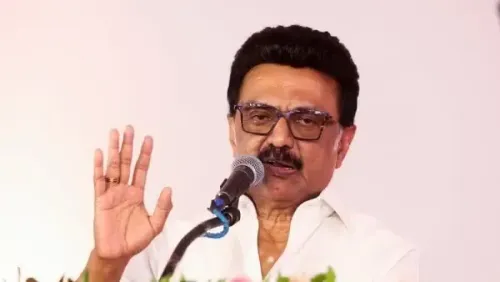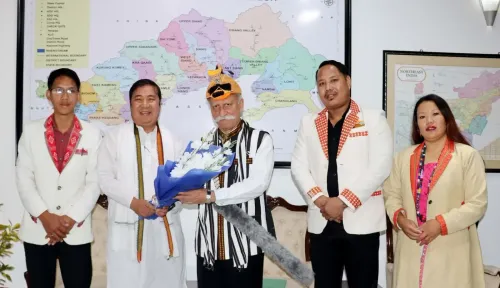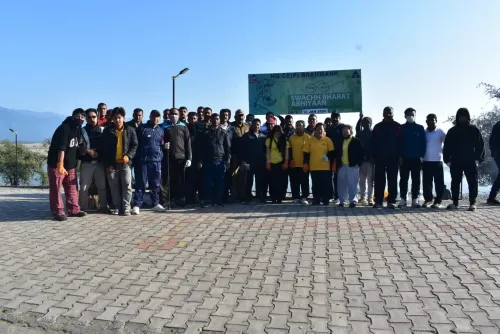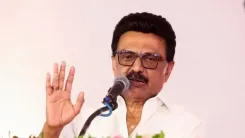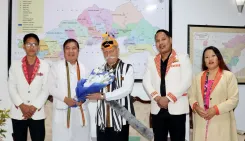Climate Experts Stress the Need for NDC Updates at TERI Summit
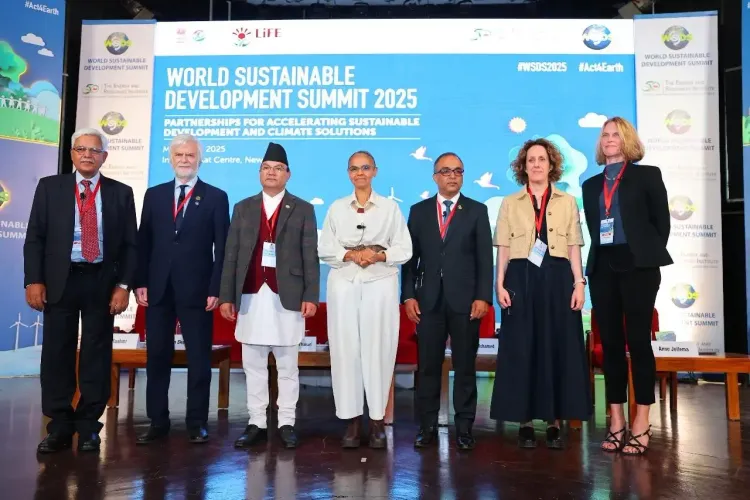
Synopsis
Key Takeaways
- Update NDCs for effective climate strategies.
- Multilateralism is key to climate action.
- India's leadership role in COP33 hosting.
- Grassroots movements are essential for climate advocacy.
- Financial support and partnerships are crucial for NDC 3.0.
New Delhi, March 6 (NationPress) A ministerial session entitled “Multilateralism on the Road to COP30 and COP33” captivated attendees on the second day of the ongoing WSDS 2025, organized by The Energy and Resources Institute (TERI).
Prominent climate experts, thought leaders, strategists, policymakers, and visionaries emphasized the urgent necessity to revise the nationally determined contributions (NDCs) to shape effective global strategies.
The distinguished panelists urged for ambitious targets and enhanced accountability, advocating for NDC 3.0, informed by the Global Stocktake (GST), to achieve tangible results. The significance of the UAE-Belém Work Programme in fortifying global climate action and accountability frameworks was also underlined.
As countries gear up to declare their NDC 3.0 commitments in anticipation of COP30 in Belem, Brazil, India has put forth a bid to host COP33.
The session, directed by R.R. Rashmi, Distinguished Fellow at TERI, sought to outline clear and impactful strategies by delineating concrete pathways and scalable solutions to expedite sustainable development, guarantee climate justice, and establish India as a pivotal voice for the global South in shaping the global climate dialogue.
In his ‘Science Leadership’ address, Prof Jim Skea, Chair of the Intergovernmental Panel on Climate Change (IPCC), asserted: “Following the release of the IPCC Special Report on limiting global warming to 1.5 degrees C in 2018, I was quoted stating that ‘limiting warming to 1.5 degrees was achievable within the laws of physics and chemistry’ but now that goal hangs by a fragile thread. Sustainable development and poverty eradication are impossible without progress on the three objectives of the Paris Agreement. We cannot advance on any one of these objectives without making headway on all three.”
Marina Silva, Minister of Environment and Climate Change, Brazil, reaffirmed Brazil's commitment to adaptation, stating: “The shift towards a low-carbon and climate-resilient economy must be not only rapid but also equitable. Brazil promotes a transition model that does not leave anyone behind, ensuring sustainable economic alternatives and implementation mechanisms that primarily support the most vulnerable populations and ecosystems.”
“As the host of COP30, Brazil emphasizes that climate responsibility is a collective obligation, and only through multilateralism and our domestic efforts combined with international cooperation can we convert commitments into actionable results.”
Aain Bahadur Shahi Thakuri, Minister of Forest and Environment, Nepal, noted: “India has made remarkable strides in renewable energy, afforestation, climate action, waste management, and sustainable agriculture. India’s experiences can guide Nepal in harmonizing environmental preservation and sustainable development while ensuring a resilient future for its citizens amid climate change.”
Andreas Bjelland Eriksen, Minister of Climate and the Environment, Norway, stated: “Many challenges exist globally at present, but that does not imply we should not collaborate. In a more challenging world, we require increased international cooperation. We must persist in our collective efforts to address the planetary crisis concerning climate, nature, and pollution.”
Muaviyath Mohamed, Minister of State for Tourism and Environment, Maldives, called for enhanced financial backing.
“Crucial elements such as effective partnerships between governments and non-state actors have bridged funding and technological gaps, spurred innovation, and promoted inclusive, transformational climate actions vital for the acceleration of NDC 3.0 implementation,” he asserted.
Calling for structural reforms in climate governance, Jennifer Lee Morgan, State Secretary and Special Envoy for International Climate Action, Germany, emphasized: “The success of the Paris Agreement will be gauged by how we hasten emission reductions; how we empower the most vulnerable and confront the costs of inaction; and how we harness the best and latest available science. NDC 3.0 and NAPs are essential for advancing just transitions and building resilience.”
Adding a business perspective, Helen Clarkson, CEO of Climate Group, underscored: “The current NDC cycle is a chance to supercharge our efforts, but for that to materialize, a diverse array of stakeholders must be meaningfully involved in setting the NDC targets.”
“For the NDCs to inspire ambition, we need precise, sector-specific transition plans with interim targets that must be bolstered by model investment frameworks. Sending a clear signal regarding ambition to businesses is also crucial, as it lays the groundwork to strengthen the private sector.”
Anne Jellema, Executive Director, 350.org, stressed the importance of grassroots movements in driving climate action and ensuring a fair transition.
She stated: “If we genuinely believe in locally-led climate solutions and a just transition, we must grant the most marginalized individuals, who are directly impacted by climate change, a genuine seat at the table and a real voice in climate funding. Nearly a decade after the Paris Agreement, it finds itself in a precarious condition. Governments are not stepping up with the ambitious NDCs necessary to expedite the end of fossil fuels.”
This plenary reaffirmed India’s rising leadership in international climate diplomacy, particularly as the nation positions itself to potentially host COP33.
The discussions underscored how multilateral approaches can be enhanced to deliver climate justice, improve adaptation frameworks, and ensure NDC 3.0 submissions to tackle the climate crisis.


